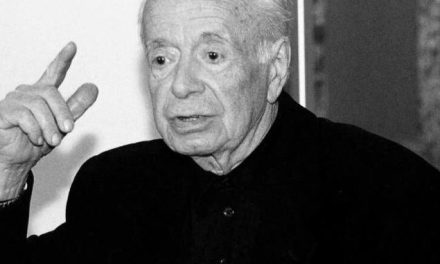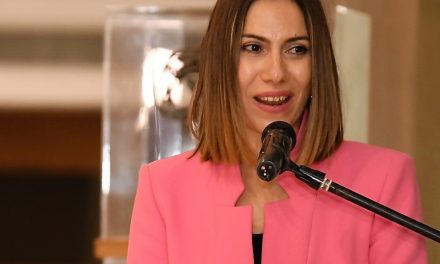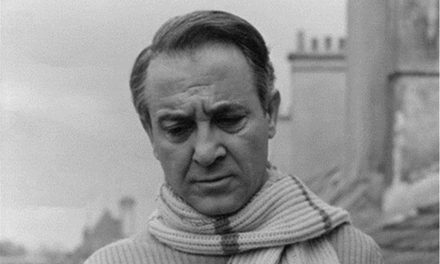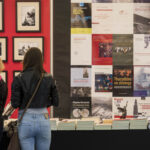As is usually the case, stereotyping embraces all nation images. George Angeletopoulos and Evangelos Aretaios with their book “Turkey: The Train of the Great Modernisation” (Το τρένο του μεγάλου εκσυγχρονισμού) take readers along a train journey in the lesser known Turkish heartland, aiming to look closer at some of the stereotypes of Turkish society.
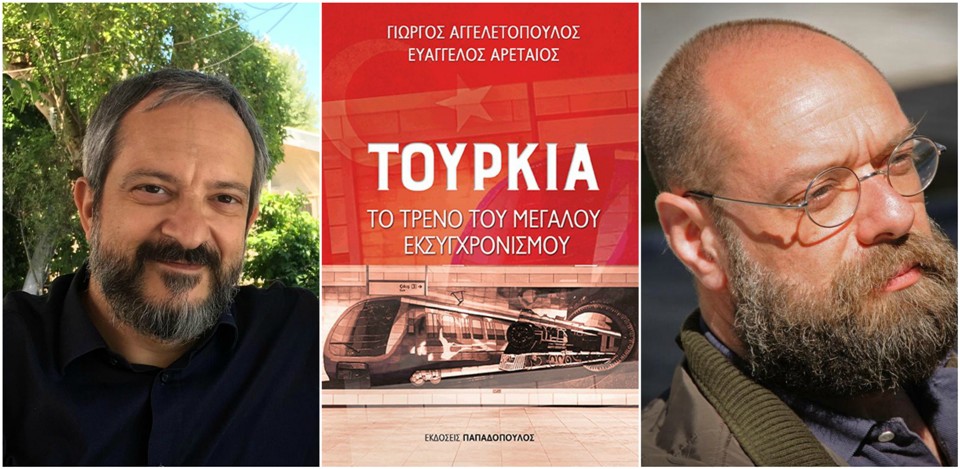
Press counselor George Angeletopoulos was born in Athens in 1967. He graduated from the History & Archaeology Department of the University of Thessaloniki, concluded his post-graduate studies at the Bosphorus University in Istanbul and received his PhD in Modern History from the University of Cyprus, Nicosia. He has served at the Greek Press & Communication Offices in Ankara (2004-2006), Nicosia (2006-2010) and Istanbul (2013-2017). His scientific interests lie mainly in Turkish foreign policy, aspects of Turkish domestic life, the Cyprus issue, Modern Greek history, as well as communication research theory and practice.
Evangelos Aretaios was born in Athens in 1971. He studied Law in France and Islamic Studies in Belgium. Since 1996, he has been on a regular visitor to Turkey and he travels to the Middle East, Africa and Europe. He lived in Istanbul from 1999 to 2007, working as a correspondent for Greek media. He works as a journalist for the Cypriot newspaper Charavgi and for the Greek site Inside Story, covering issues of the European Union and Turkey. He has published two novels, a collection of short stories, and a book on politics and society in Turkey titled “From Gezi’s Utopia to the coup” (2018).
Greek News Agenda interviewed* co authors Angeletopoulos and Aretaios on their book “Turkey: The Train of the Great Modernisation”, the fruit of a long observation and deep knowledge of Turkish society, that subverts many of the clichés pertaining to this country, focusing on the rapid modernization of the Turkish society, contrary to the prevailing view of Turkey being gradually and irrevocably Islamized.
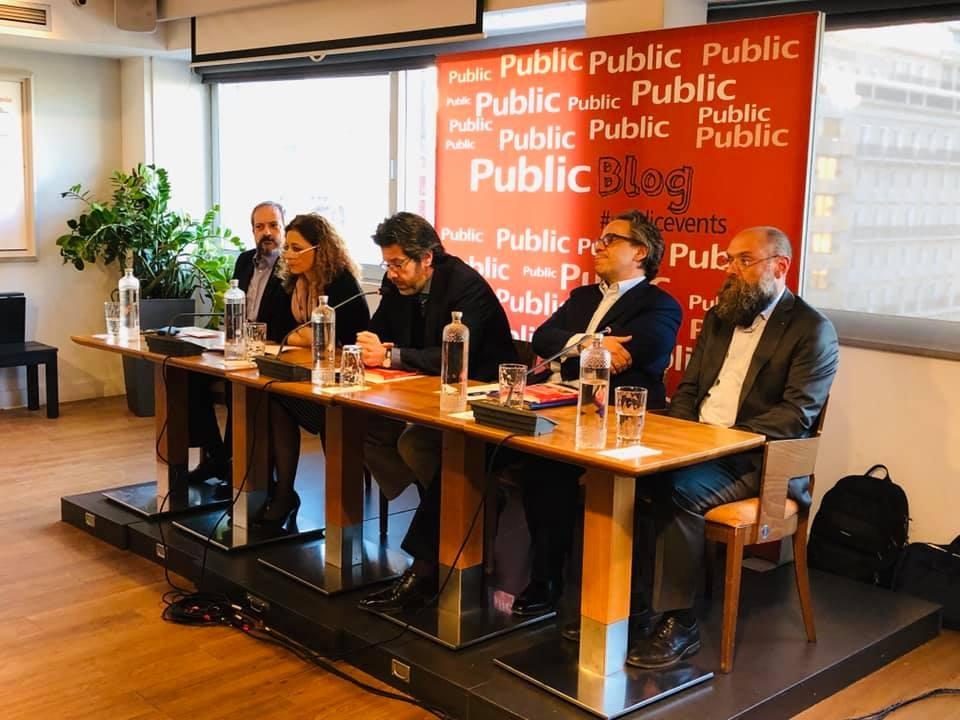
Book presentation in Athens. From left to right: George Angeletopoulos, Panagiota Manoli (Assistant Professor in Political Economy of International Relations), Angelos Athanasopoulos (journalist, To Vima), Vassilis Karatzas (CEO, Levant Parteners) and Evangelos Aretaios
Your book is a road trip to “the three Turkeys”: The one that is western and modernized, the central and conservative, and the Kurdish part, which is the least developed. Is there a common Turkish identity?
The term “three Turkeys” is a neologism coined by KONDA’s chief pollster Bekir Ağırdır, whose opinions are highly valued by social scientists, far sighted politicians as well as that specific part of public opinion described as the “attentive public”, to use a term introduced long ago by Vincent Price. The thing is that one might discern three or more Turkeys, depending on the criteria established each and every time in order to describe particular aspects of the country’s political or social reality. Your question, for example, reflects two intersecting points of view, the economic (“developed”) and the social (“modernized/conservative”) ones. All these different facets of Turkey, either political, social or cultural, no doubt constitute a common Turkish identity, put together by the cohesive power of the central Turkish state and its various mechanisms. This is not an isolated or peculiar paradigm since most modern nation-states administer directives and exert their institutional homogenizing power through various moderating schemes, the state, the government and the education system. On the other hand, it is true that there has been a huge discussion on the particular way by which Turkey was “modernized”, i.e. introduced to the western political and cultural system and formed its national identity. The majority of the academics who study this tranformation agree on the fact that it was initially accomplished “from the top down” by the founder of the state, Mustafa Kemal Atatürk. Nevertheless, after WWII and the gradual opening up of Turkish society via pluralism and multi-party politics, one can pinpoint to a rather societal – namely grass roots – genuine participation in the building of a collective national identity. With the ascension of Erdoğan’s party AKP to power,there has been a shift, at least nominally, in what constitutes this identity, towards more conservative and traditional references. So, yes, we believe that there exists “a common Turkish identity” and although it has historically shaped and consolidated characteristics, we don’t think of it as being still, unaffected by or impermeable to change.
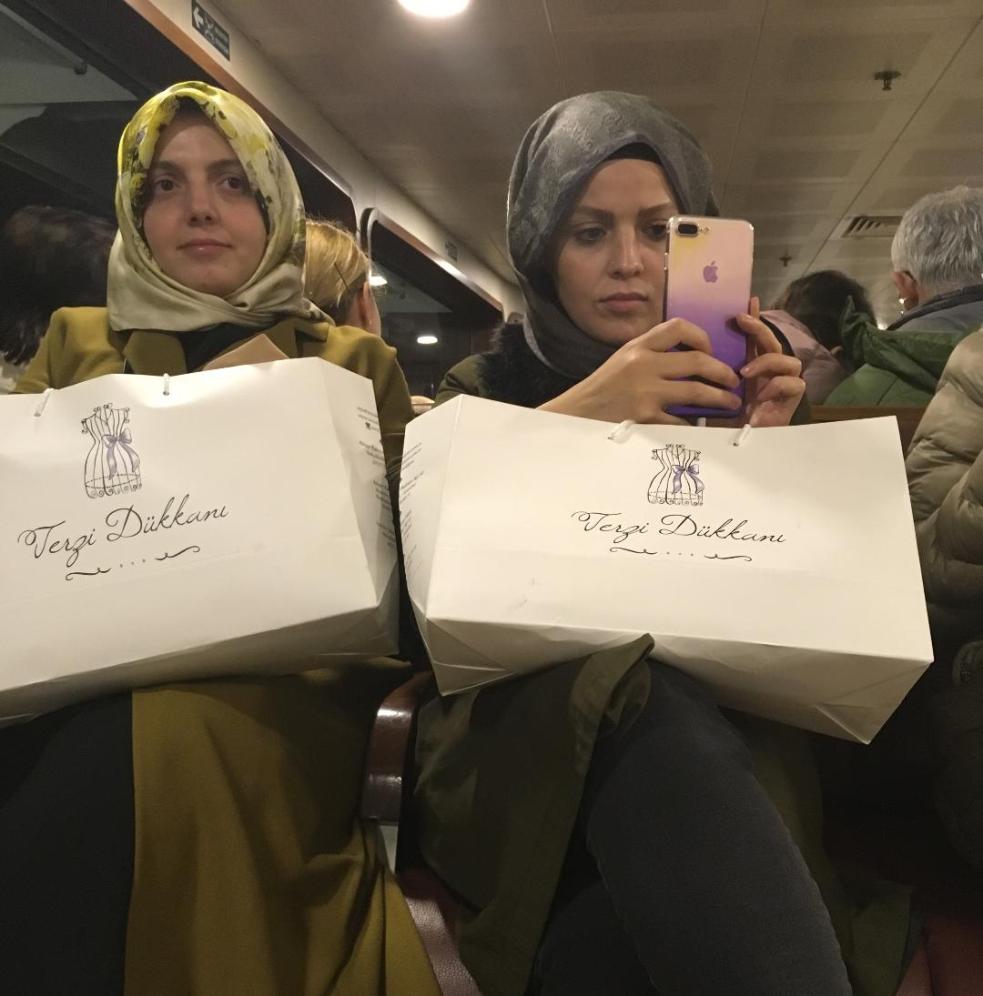
In your book you focus on the notion of “transitionalism” characterizing Turkish society, which means neither modernism nor traditionalism. Would you like to elaborate?
Let us make clear that all three human types, the “traditional”, the “transitional” and the “modern” are present in Turkish society but it is the “transitional” type that attracted our attention as that with the most interest. As we traveled through the country back in 2018, talked with the people and exchanged views with members of its intelligentsia and academia, we discovered that a great number of people living in present-day Turkey continue to experience profoundly the personal and collective process of change. Sixteen years of AKP rule has had a significant impact on people’s lives: A new urban Muslim middle class has emerged, both in the western as well as the central provinces of the country, establishing higher standards of living, acquiring certain commodities and developing new needs. This has led to a gradual and partial departure from old habits, attitudes and behaviors that had defined themselves and their everyday lives until then. This is certainly not an easy transformation, not one without obstacles, back steps and a constant feeling of “wrong-doing”. It is exactly as David Lerner, an eminent American social scientist, had described it 60 years ago, when he came up with the term “transitional” in order to describe the psychological, attitudinal, as well as the social transformation of the citizens of Turkey when exposed to the all permeating process of modernization. In his 1958 book “The Passing of Traditional Society. Modernizing the Middle East”, Lerner emphasized that “the true Transitional is defined, dynamically, by what he wants to become […] The Transitionals, at various phases of modernization, are making their way toward an unclear future via a path replete with hard bumps and unsuspected detours. Their voyage entails a sustained commingling of joyous anticipations with lingering anxieties, sensuous euphoria with recurrent shame, guilt and puzzlement. From their changes of pace and their shifts of direction we learn how they perceive the terrain, its pitfalls and its promises”. It is exactly these “hybrid” human types and identities that are evolving in front of our eyes in contemporary Turkey, influenced and shaped by the powers of new mass media technologies and globalization, just as they did so in Lerner’s time through their exposure to the powers of urbanization and media participation, to name but a few.
Contrary to the prevailing view that Turkey is heading towards Islamization, in your book you argue that in recent years Turkey has been moving towards modernization, and that there is even an “internal secularization of Islam”. Why do you think it is so and how do you define modernization in your book?
This conclusion is a product of our observations and readings over the past 20 years, accompanied and further strengthened by the findings of our recent train travels throughout Turkey. This last trip served, one might say, as the culmination of our common mindset pertaining to the evolution/transformation of personal attitudes of the more or less conservative citizens of Turkey in the last decades, under the influence of the ubiquitous process of modernization. Actually, what we highlight in our book is the fact that, as you have correctly put it, contrary to the prevailing view of Turkey being gradually and irrevocably Islamized, Turkish society is moving rapidly towards secularization rather than returning to traditional attitudes and behaviors influenced by religion. There is plenty of evidence subscribing to this conclusion along with the consequent theorizing too. Starting from the late 90’s, when sociologist Nilüfer Göle talked about “Islamist elites” and “hybrid conjunctions”, up to 2015 when her colleague Volkan Ertit published his book about the “uneasy conservatives”, one can find plentiful examples of attitudinal change ranging from pre-marital relations and alcohol consumption to social media self-exposure. Moreover, what we emphasize in our book is that Islam itself is undergoing transformation as it is obliged to respond to new situations and to the new needs of its followers. By doing so, it adopts a new vocabulary and new outward postures. For example, the Imam of a central Istanbul mosque promoted himself in an interview not only as a man of religion but also as a singer as well as an athlete of…martial arts! Another vivid example – included in our book – is the need felt by the Directorate of Religious Affairs to issue a directive to its spiritual guides exhorting them to be “sensitive to the sexual inclinations” of those taking recourse to their advise. Politically speaking, Islam has seized to be exclusively a religion from the moment it started to function in an era of modernization. Looking for ways of both standing against the successive political and cultural sorties of the west to its territory and of adapting to the new ethos, it gradually started to function more as an ideology, thus acquiring the modern structural traits of the latter. In light of the above, we view modernization as an all-permeating dynamic procedure of economic, social and political transformation of peoples’ beliefs, attitudes and behaviors in a manner that gradually alienates them from the traditional values and habits and ushers them in an era of individual-centered, religion-less and risk-oriented ways of life.
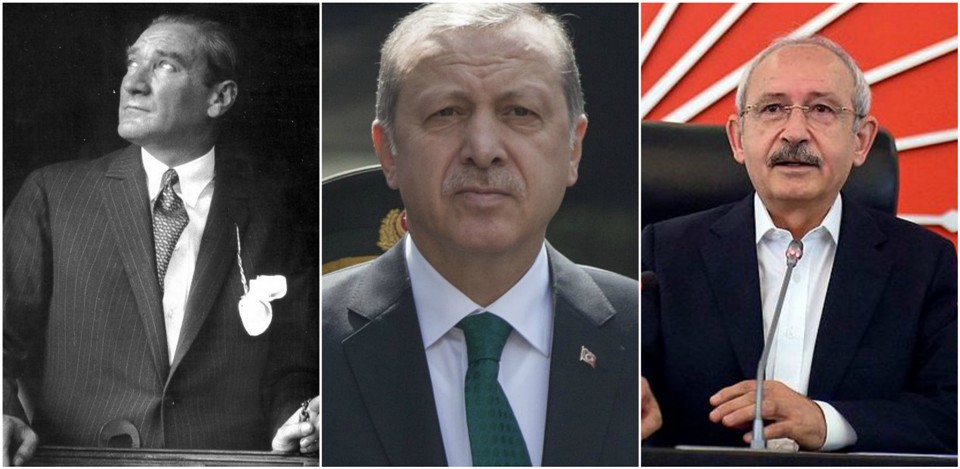
From left to right: Kemal Ataturk, founder of the Turkish Republic, Recep Tayyip Erdoğan, President of Republic of Turkey and Kemal Kılıçdaroğlu, leader of major opposition party (CHP)
Turkey was modernized through the reforms of Kemal Ataturk, following a top down process. Today there is a bottom up process of modernizing Turkey, stemming from the rise of the “underprivileged”. How can this modernization process affect the policy of both the ruling party and the opposition?
It has already done so! This has to do with the aforementioned “all-permeating” characteristic of the modernizing procedure from which neither the ruling party nor the opposition can escape, even if they wanted to! We want to clarify that modernization is a process that occurs beyond a person’s value judgments, that is irrespective of how one might call it, good or bad, a blessing or a curse, the embodiment of optimism or of pessimism. The question it poses for participants is structural and ontological at the same time. Modernization exposes individuals and societies to new lures and needs created both economically and culturally. This new overall edifice tends to expand in every aspect of everyday life, from the way we perceive time (cyclical in traditional societies, linear in modern ones) to the way we consume and choose our leaders. Turkey could not be an exemption. Note parenthetically that in Greece we have experienced a similar phase of the rise of the “underprivileged”, their acquirement of access to political power, reshaping the legitimacy of the political terms in use and reclaiming the cultural symbols of acceptance and justification in social space. At the same time, though, they did not remain unchanged and untouched by the structural procedures of modernization. A simple reflection on their appearance, political preferences, vocabulary and cultural references over the past 40-50 years is convincing enough. Mutatis mutandis this is valid for Turkey as well. Tayyip Erdoğan and his party came to power representing the “underprivileged” with a rather liberal political and economic agenda. Despite the gradual authoritarian shift from 2011 onwards, the promises for liberty in public sphere and free self expression lived on and – what is more important – they were partially experienced in practice by his followers. Concomitantly, the quest for more spaces of freedom, both personal and collective, are omnipresent in people’s hearts and minds and constitute accomplishments, real and/or figurative, that cannot simply be put to rest. The same thing is valid for the opposition too. Being used to dominate the scene for decades both politically and culturally, they have tasted the rather traumatic experiences of successive political defeats and symbolic marginalization with no visible signs of recovery. Some of them succumbed to what they considered as the “inevitability of Islamization of everyday lives”, failing thus to tell between “laicite” and “secularization”. As explained in our book, the first notion deals with the way a state/ a government defines and moderates the role of religion in the political and social space. Conversely, the second notion refers to the dynamics rising from within society when coming across the question of the role, extent and gravity that religion should have in mindsets and in practice. Consequently, the Turkish opposition could not remain untouched by the voiced needs of society for more democracy, more peaceful and respectful coexistence, more “justice”; it is already passing through the painful procedure of mental and political transformation and must heed more to these demands if it wants to keep up with the pace of modernity which, ironically, it was their political ancestors that had initiated in Turkey about 100 years ago.
Since the dissolution of the Ottoman Empire at the beginning of the 20th century, the notion that prevails in the Turkish subconscious is that foreign powers threaten Turkey’s national sovereignty. How is the view of an “external enemy” reflected in Turkish society?
In our opinion, we are talking about a deeply imbedded feature of Turkish collective identity, shaped, as you mentioned, by historical experience but also systematically nourished over the years by the state. This specific historical experience, though, is perceived and construed rather selectively. For example, it wasn’t only the antagonizing forces of the West and the East that paved the way to the destruction of the Ottoman Empire, but also the political decisions of the Committee of Union and Progress that had played a crucial role to this outcome. Political science professor Baskın Oran puts it eloquently when he talks about the “Sevres syndrome” which haunts the Turkish collective mentality, both statesmen and commons. In other words, it’s not just a subconscious fear but a consciously and overtly cultivated anticipation with very obvious political usages. Foreign powers – with indigenous minorities serving as their local agents/ collaborators – depict in their minds “the enemy” that is constantly, deviously and repeatedly looking down on and undermining Turkey and the Turks. This perception cuts across political (p)references since it vividly exists in the minds of CHP adherents and thrives nowadays in the perception of the pro-government supporters. The latter, living in an imagined quasi Hamidian era, consolidate their support for the modern equivalent leader, R.T. Erdoğan, while at the same time they hold responsible for the “subversive acts” against their country both the political offspring of the “Young Turks”, i.e. the oppositionist CHP, as well as the “conspiratorial” West by and large. Besides being a self fulfilling prophecy, this perception constitutes also a vicious circle that obscures a safe judgment and a more balanced attribution of responsibility for whatever ill-functioning there might exist in Turkey.
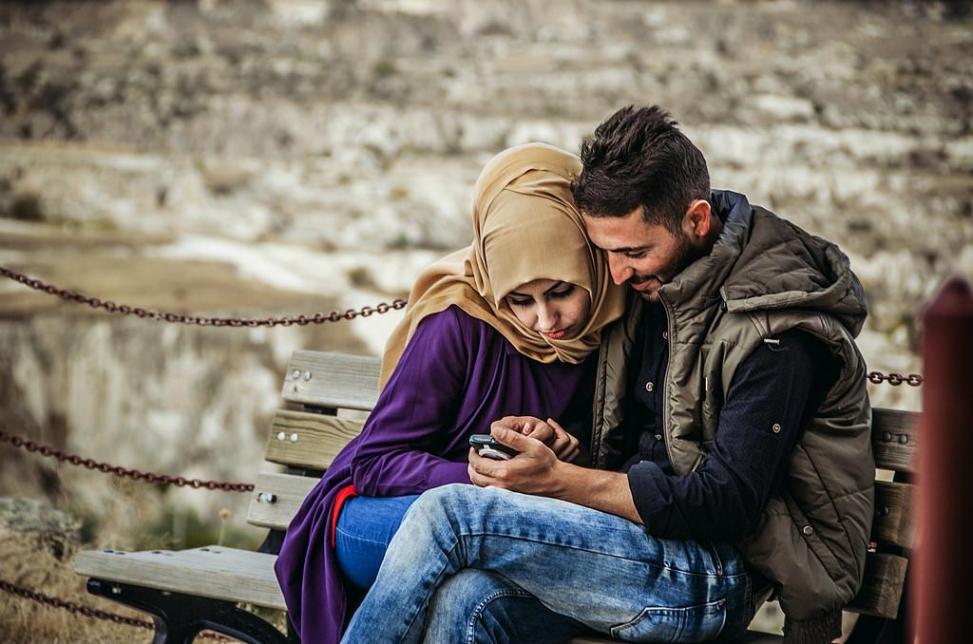
You refer in your book to the theory of cognitive dissonance between traditional upbringing and modernization. In what ways is this discrepancy evident in youth and women?
Allow us to refer you again to David Lerner. As already cited above, the American social scientist described the personal adventure of modernization as a “way toward an unclear future via a path replete with hard bumps and unsuspected detours. Their voyage entails a sustained commingling of joyous anticipations with lingering anxieties, sensuous euphoria with recurrent shame, guilt and puzzlement”. This is exactly what we found out in our Turkish train trip. The young generation claims public space projecting its own particular cultures. They start to question traditional values, not always in a straightforward manner as do their coevals in the West, but in the same decisive fashion. Girls may continue to defend their right to cover their heads but at the same time they do it in such a way so as to attract and not to discourage male attention, as explicitly said by the young employee in Konya. The youth of Turkey live together in the public sphere, reclaim their right to flirt, to fall in love and to be socially visible, a procedure which is internalized by them with all its assets and liabilities, with the fervor of the newcomer and at the same time with the restriction and the guilt of “crossing the red lines” of their social habitus. Not an easy task at all! Social psychologist Leon Festinger described this process in a different setting using the term “cognitive dissonance”, meaning that people tend to find plausible excuses for keeping up doing things that are harmful or socially frowned upon. Nevertheless, what we see in Turkey is that this dialectic of backs-and-forths ends up in the medium term in the transformation of attitudes and – to a certain extent – of behaviors. The scope of such observations, of course, is limited since we didn’t conduct a full scale survey but we think that combined with the conclusions reached by the scientists cited in our book they constitute a very strong thesis to the described direction.
Turkish opposition accuses Erdogan of trying to impose a more conservative lifestyle on society. What is Turkish society’s reaction, if any? Is there any resistance or is it heading towards islamization?
The publicly declared aim of Erdoğan’s politics is the creation of a new young “pious generation”, whatever that might mean. Religious and conservative people existed in Turkey before. With the AKP coming to power, they were broadly seen; they were made “socially visible”. What the majority of western observers miss, though, is the fact that this “conservative lifestyle” is not stable and unchanged but dynamic and resilient. For example, we haven’t yet come across a mass movement of doing away with the headscarf, but we have indeed been witnesses to the new Islamic fashion, ranging from new outfits to distinct stores and special magazines. The “revolution” brought about does not pose as an overall rejection of tradition and/or traditionalism but it constitutes a breach with the traditional male imposed conduct that women are supposed to adapt to, that is to stay hidden, away from “penetrative” male eyes and “inappropriate” conducts. The existence and constant development of “hybrid” identities that we have already described constitutes a specific and decisive form of “resistance” to the officially promoted cultural politics. It is not necessary to have only landmark social events such as the Gezi uprising back in 2013 in order to conclude that something is changing. The slow but revolutionary transformation of personal attitudes and perceptions sets a different but equally powerful pattern of modernizing change, which is more than evident in present-day Turkey. As Bob Dylan had aptly put it, sometimes “you don’t need a weatherman to know which way the wind blows”!
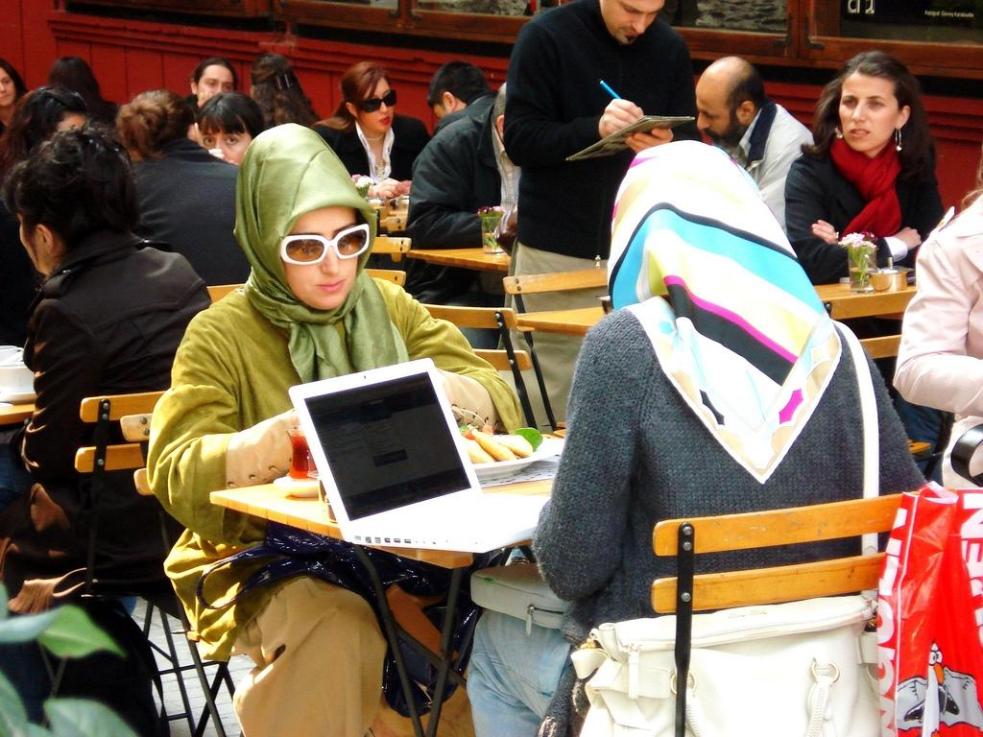
Nationalism in Turkey: Is it a characteristic of the Islamists or the Kemalists?
We think that it is a common trait to both. In 1974, the invasion in Cyprus was decided by a coalition government led by CHP’s Bülent Ecevit on the one hand and the Islamist Milli Selamet Partisi’s Necmettin Erbakan on the other. Today, Erdoğan talks frequently and ambiguously about “the borders of our hearts” when referring to the geography of the erstwhile Ottoman Empire, while the CHP opposition attempts an equally nationalist verbal counter attack by attracting the attention to the “18+1” islands of the Aegean sea that Greece has allegedly “occupied”. The same aggressive rhetoric takes place in other circumstances as well, in cases where Greece is not directly involved. It is noteworthy that this attitude derives from a deeply rooted feeling of “victimization”. During our trip, we came across the aforementioned belief of many of our interlocutors, namely that Turkey and R.T. Erdoğan are being undermined and subverted by “jealous” and “devious” western powers. Next to this commonly shared feeling of “victimization” lies a similar one, that of “seclusion”, especially vivid in the case of the Aegean Sea. In the minds of many Turkish politicians and citizens, the West via Greece is trying to keep Turkey “confined” in the Asia Minor peninsula using the surrounding geographical formation of the Aegean Greek islands as a tool. So a “big state” such as Turkey simply cannot put up with this situation and “has to break the chains of seclusion”. CHP’s Nihat Erim, who had served as Prime Minister in the late 70’s, expressed characteristically this point of view in his legal notes to the then Turkish Prime Minister Adnan Menderes back in 1956 with respect to the Cyprus issue. So, if one is raised to believe that he/she is a member of a “great military nation”, inhabiting a big state (büyük Türkiye) that has been – and still is – wrongfully “victimized” and threatened by “seclusion”, then you have all the ingredients that at a certain point of time might have destabilizing effects.
Keeping in mind the polarization prevailing in the Turkish political scene and given that Turkish society is composed of different cultures, would you say that the model of coexistence in Turkish society has been preserved?
An interesting observation occurred to us in the course of writing our book. The Turkish language has three different expressions in order to define “coexistence”: “bir arada” meaning “all together”, “yan yana” meaning “next to each other” that is without intermingling and “iç içe” meaning “intermingled”. All three ways are present in contemporary Turkey in a rather peculiar coexistence, this time of corporatist practice with exclusionist/discriminatory mindsets. Political polarization is a practice that separates Turkish society in real time; this does not prevent public actors and state dignitaries from insisting rhetorically on the “equal footing” of all “Turkish citizens” or putting emphasis on the spirit of “unity and togetherness” (birlik ve beraberlik) that must permeate common attitudes and direction. In times of political and social unrest the limits of this model are tested but the imprints of this painful process are still visible. Nevertheless, what we observed and recorded in our book is an expanding demand stemming from different and opposing political and cultural affiliations in Turkey for more and real democracy with checks and balances, as well as for a social environment with genuine and mutually respectful relations. This is very important in our opinion since it modernizes the traditional value of and demand for “justice” (adalet), taking it away from its traditional connotation “to everyone according to his/her standing in social hierarchy” and bringing it closer to the notion “to every human being irrespective of his/her ethnic, cultural or political characteristics”.
* Interview by Florentia Kiortsi and Christina Fiorentzi.

